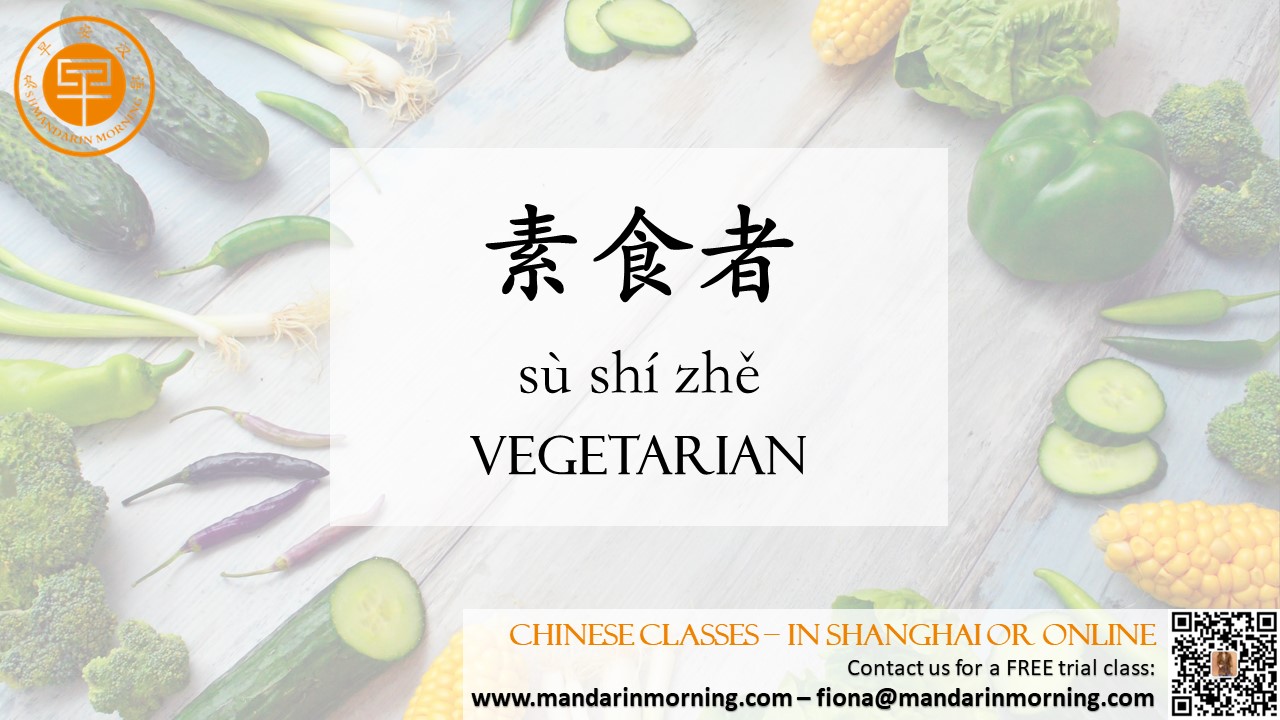| Sticking to a vegetarian diet in China can either be challenging or straightforward depending on your expectations. Fortunately, vegetables (蔬菜 shūcài), grains (谷物 gǔwù) and beans (豆子 dòuzi) are staples of Chinese cuisine, so surviving as a vegetarian in China is certainly possible. In many Chinese homes, dinner tables are filled with abundant and flavorful non-meat dishes, from stir-fried bitter melon to oven-roasted tofu. Luckily for vegetarians, one usually doesn’t need to look far to find scrumptious food in which meat isn’t the main ingredient. Vegetarianism isn’t exactly widely practiced in China. It is estimated that about 4% of the population regularly follows a meat-free diet. No matter where you go in China, you’re sure to have a more seamless experience if you know some Chinese terms and phrases geared towards vegetarians.  Common vegetarian dishes 地三鲜 (dìsānxiān) = stir-fried eggplant, sweet peppers and potato 凉拌黄瓜 (liángbàn huángguā) = cold tossed cucumbers 拔丝红薯 (básī hóngshǔ) = candied sweet potatoes 香菇青菜 (xiānggū qīngcài) = braised bok choy and mushrooms 苦瓜炒鸡蛋 (kǔguā chǎo jīdàn) = fried egg and bitter melon 青椒土豆丝 (qīngjiāo tǔdòu sī) = fried shredded green pepper and potato 白灼西兰花 (báizhuóxī lánhuā) = fried broccoli 西红柿炒蛋 (xīhóngshì chǎodàn) = fried egg and tomato 葱油饼 (cōngyóubǐng) = scallion pancakes 蒜泥菠菜 (suànní bōcài) = fried spinach with garlic Useful phrases Try out the following phrases when ordering or purchasing food in China: 我是吃素的 (Wǒ shì chīsù de) = I am a vegetarian. 我是素食主义者 (Wǒ shì sùshízhǔyìzhě) = I am a vegetarian. 我是纯素主义者 (Wǒ shì chúnsùzhǔyìzhě) = I am a vegan. 我吃。。。(Wǒ chī...) = I eat... 我不吃。。。(Wǒ bù chī...) = I don't eat... 我什么肉都不吃 (Wǒ shénme ròu dōu bù chī) = I do not eat any meat. 我什么荤的都不 (Wǒ shénme hūn de dōu bù chī) = I do not eat any animal products. 请用白开水煮汤 (Qǐng yòng báikāishuǐ zhǔ tang) = Please use water as the soup’s broth. 不要加。。。(Bù yào jiā...) = Do not add... 我不要。。。(Wǒ bù yào...) = I don't want... Note that the phrase 我是吃素的 (Wǒ shì chīsù de; I am vegetarian) is perhaps the most important one on the above list. Enterprising beginner students of the Chinese language unfamiliar with the character 素 (sù; a rarely-used word for vegetable) may be tempted to use the seemingly more straightforward phrase 我不吃肉 (Wǒ bù chī ròu; I don’t eat meat) instead. This strategy can backfire, however. Just saying that you don’t eat meat can be ineffective because the Chinese word for meat, 肉 (ròu), is frequently used to mean “pork” instead of meat in general. When you say that you don’t eat 肉 (ròu) in China, your listener may assume that you just don’t eat pork, but that other meats, such as beef and chicken, are fine. Therefore, if you are vegetarian, make sure that you go the extra mile and learn the phrase 我是吃素的 (Wǒ shì chīsù de; I am vegetarian) before your trip. |